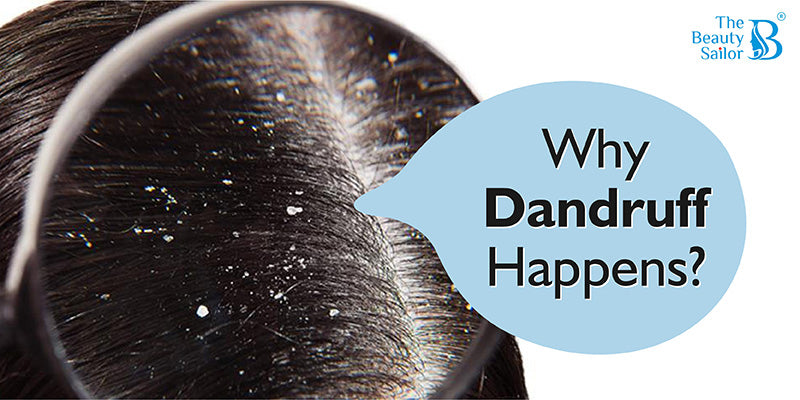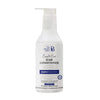Why Dandruff Happens: Understanding The Science Behind It

Dandruff is a common scalp condition that affects nearly half the population. Characterized by flaking and sometimes itching, it can be both an aesthetic and a comfort concern for many. While numerous shampoos and treatments are marketed for relief, understanding the underlying causes of dandruff is essential for effective management. This condition is not only a source of discomfort but also a significant social and psychological burden for some individuals. This blog delves into the scientific reasons behind dandruff, exploring how genetic, environmental, and lifestyle factors contribute, and how selecting the right hair care products can help in controlling this pervasive scalp issue.
What is Dandruff?
Dandruff is primarily characterized by the excess shedding of dead skin cells from the scalp. Under normal conditions, this shedding process is natural and goes unnoticed. However, several factors can accelerate skin cell turnover, making the shedding highly visible and problematic. These white, oily flakes not only mar the appearance of your hair but can also lead to itching and discomfort. The visibility of these flakes can be a significant source of embarrassment and frustration, impacting one's social confidence and self-esteem.
Causes of Dandruff

The exact causes of dandruff are multifaceted and differ widely among individuals, encompassing a variety of physiological and environmental factors:
- Seborrheic Dermatitis: A prevalent skin condition found predominantly in areas abundant in oil glands, such as the scalp. It manifests as red, greasy skin adorned with flaky white or yellow scales, often causing discomfort and aesthetic concerns.
- Malassezia: This fungus, which resembles yeast in shape, naturally lives in the human scalp. When it increases beyond normal levels, it can irritate the scalp and accelerate the turnover of skin cells, which in turn manifests as dandruff.
- Contact Dermatitis: Often triggered by a reaction to certain hair care products, this condition can lead to a red, itchy, and scaling scalp. Individuals may experience varying levels of discomfort, highlighting the importance of identifying and avoiding irritants.
The Role of Hair Care Products

The choice of hair care products plays a pivotal role in managing scalp health. Sulphates, commonly found in shampoos, are detergents that help lather and cleanse. Despite their effectiveness, they can strip the scalp of its natural oils, leading to dryness and irritation. Switching to a sulphate free shampoo can reduce these effects by gently cleansing the scalp without removing essential moisture. Moreover, sulphate free shampoos are often enriched with natural ingredients that nourish the scalp and fortify hair, contributing to overall hair health and preventing further irritation. This mindful selection of hair care products is crucial for those with sensitive scalps or those looking to maintain optimal scalp health and hair vitality.
Tips for Managing Dandruff
- Regular Washing: To prevent the accumulation of excess oils and dead skin cells that nourish dandruff-causing fungi, it is crucial to maintain a regular and thorough scalp washing routine.
- Balanced Diet: The health of your skin, including your scalp, significantly benefits from proper nutrition. Consuming a balanced diet enriched with zinc, B vitamins, and essential healthy fats can play a vital role in sustaining scalp health and preventing dandruff.
- Stress Management: Managing stress effectively through regular exercise, meditation, or engaging in enjoyable hobbies can significantly reduce the severity of dandruff. Stress is known to trigger or worsen scalp issues, making stress management a key component in the fight against dandruff.
Advanced Treatments and Remedies
For severe cases of dandruff, over-the-counter medicated shampoos and treatments can be highly effective. Active ingredients such as ketoconazole, coal tar, salicylic acid, and selenium sulfide are specifically designed to combat the underlying biological mechanisms that cause dandruff. These components help reduce inflammation, slow down excessive skin cell production, and minimize flaking. Transform your hair with tailored treatments that address the root causes of dandruff while promoting healthier scalp conditions. For persistent or severe symptoms, it is advisable to consult with a dermatologist who can provide guidance based on your individual scalp condition.
Combat Flakes Naturally with The Beauty Sailor Dandruff Control Shampoo
Experience the ultimate solution for a flake-free scalp with The Beauty Sailor Dandruff Control Shampoo. Expertly formulated with nature-derived ingredients, this shampoo soothes irritated skin and reduces the visibility of dandruff with regular use. Its gentle yet effective cleansing action preserves the scalp’s natural oils, promoting healthier hair. Ideal for those seeking a reliable and gentle approach to conquering dandruff, this shampoo is a must-have for maintaining scalp health and hair vitality.
Conclusion
Understanding the science behind dandruff is the first step towards effective treatment. Identifying the root causes and adjusting your hair care routine, especially by incorporating a sulphate free shampoo, are critical for maintaining a healthier scalp. Managing dandruff typically involves a holistic approach, combining good scalp hygiene, a proper diet rich in essential nutrients, and choosing the right hair care products that do not aggravate the scalp. Regularly monitoring the condition and adapting your regimen accordingly can also make a significant difference. Remember, a healthy scalp leads to healthier, more vibrant hair.












